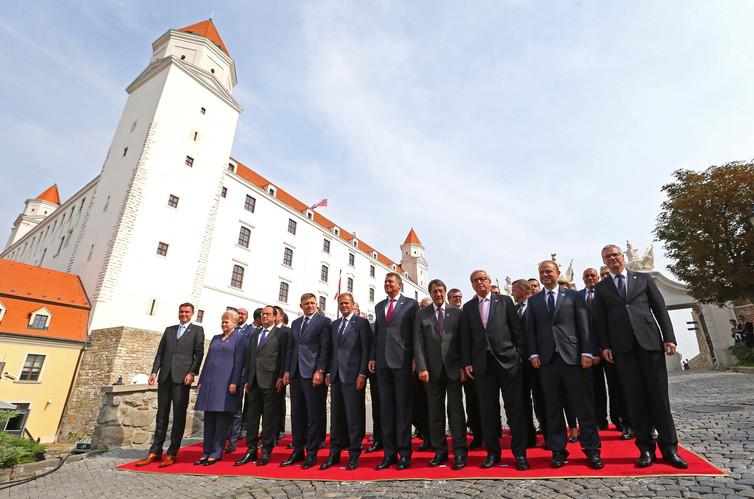Poland – Can the EU extend the scope of its competences, without member states having a say, through the decisions of the European Court of Justice? That was the question the Polish Constitutional Court had to answer when it considered, on Wednesday 14 July, a petition by the Disciplinary Chamber of the Supreme Court, which had been “suspended” by the ECJ by virtue of an interim order issued in the spring of 2020. On 3 August, the Polish constitutional judges will have to respond to a similar request from Prime Minister Mateusz Morawiecki. The latter referred the matter to the Constitutional Court when, on 2 March, the ECJ claimed it was giving the Polish High Administrative Court (NSA) the right not to recognise judicial appointments made after a reform of the Polish law on the National Judicial Council (KRS). According to the law and the Constitution in force in Poland, the NSA does not have this power.
In its efforts to assert the primacy of European law, on 9 June the European Commission asked the Polish Prime Minister to withdraw his referral, but he refused. It was also on 9 June that the Commission initiated proceedings against Germany over a 2020 ruling by that country’s Federal Constitutional Court, which reaffirmed that
the Member States remain “masters of the treaties”, meaning that the EU institutions cannot themselves extend their own powers in defiance of the treaties signed and ratified by the 27 countries through a lawful, democratic process.
Also in June, the Romanian Constitutional Court reminded the ECJ of the limits of its powers by refusing to recognise the validity of its decisions in areas of national competence. The Romanian case was similar to the one that led the Polish Prime Minister to refer an ECJ ruling to his country’s Constitutional Court.
In its 14 July ruling, the Polish Constitutional Court recalled that the ECJ’s interim measures concerning the organisation and functioning of Polish courts are incompatible with the Polish Constitution, as Poland has never transferred its competences in this area to the EU.
Such a transfer of competence can only be made by means of a treaty signed and ratified in accordance with lawful democratic procedure, and not by means of an interpretation of the existing treaties that goes far beyond their letter and spirit.
This is essentially what the Polish Constitutional Court said in legal language, referring to the relevant articles of the European treaties and the Polish Constitution.
It is therefore a real war of the courts that we seem to be witnessing today, since on the same day, July 14, the Spanish Vice-President of the ECJ (the same one who ordered, after a single-judge hearing, the closure of the Turów mine) issued a second interim order at the request of the European Commission to order the Disciplinary Chamber of the Polish Supreme Court to suspend all activity. The Commission considered that the interim measures taken last year by the ECJ were not being applied. And for good reason! As the Polish Constitutional Court has just confirmed, the Polish Constitution does not allow such a transfer of powers based solely on the arbitrary decisions of the judges in Luxembourg.
And things got even more complicated when the next day, Thursday 15 July, the ECJ, which this time was not sitting as a single judge as in the case of interim orders, delivered a judgment on the merits of the case and ruled that the disciplinary regime for judges in Poland does not comply with EU law.
Although the Polish Constitutional Court only ruled on the interim measures adopted by the ECJ, the problem is identical for this final judgment: it rules on the organisation of the Polish judicial system without the Poles (or any other nation, for that matter) having transferred any competences to the EU in this area.
Either the Polish government and parliament will now reverse the judicial reforms to bring the law into line with the wishes of the Commission and the ECJ, thereby reinforcing a large de facto extension of EU competences through case law rather than through a democratic process, or the matter will again be taken to the Polish Constitutional Court, which will have to reiterate that the ECJ ruling cannot be applied in Poland because it concerns an area of national competence. The conflict between Warsaw and Brussels could then seriously escalate.
In a statement, the European Commission said it was “deeply concerned by the decision of the Polish Constitutional Tribunal, which states that the interim measures ordered by the Court of Justice of the European Union in the area of the functioning of the judiciary, are inconsistent with the Polish Constitution.” It further stated that “the Commission has always been very clear on this matter and reaffirms once more” that “EU law has primacy over national law” and that “All decisions by the European Court of Justice, including orders for interim measures, are binding on all Member States’ authorities and national courts.”
However, as Jerzy Kwaśniewski, chairman of the Ordo Iuris Institute, points out, “The problem lies in the evolutionary change of EU law. Poland has ratified the accession treaties and, in particular, the Treaty of Lisbon. However, the EU institutions, and in particular the Commission and the Court of Justice, have been expanding the scope of their competences and giving themselves additional powers over time, at the expense of the member states. And
it is the compatibility with the Polish Constitution of these powers of the Union being systematically extended without the consent of the member states that is the subject of the proceedings before the Constitutional Court.”




